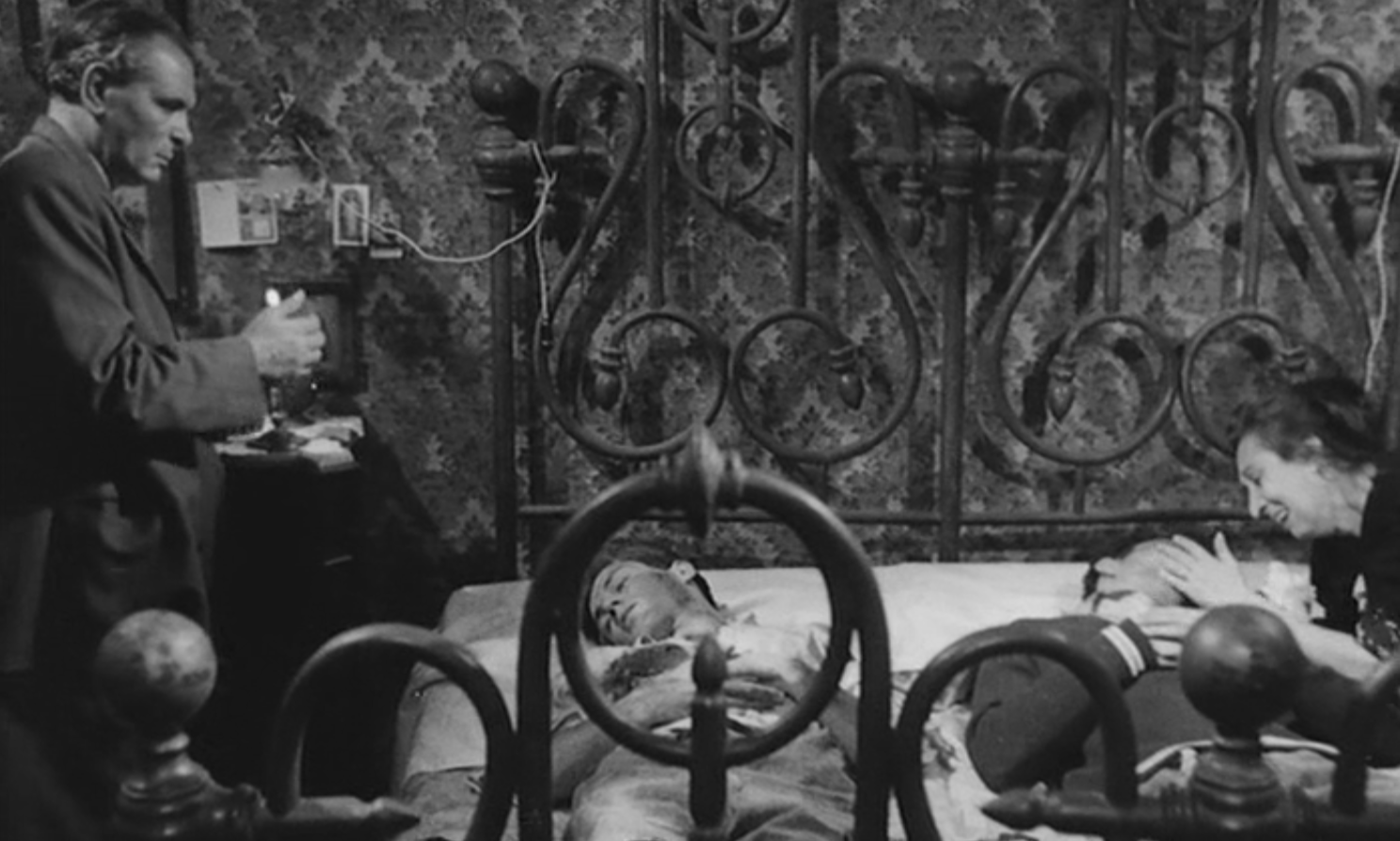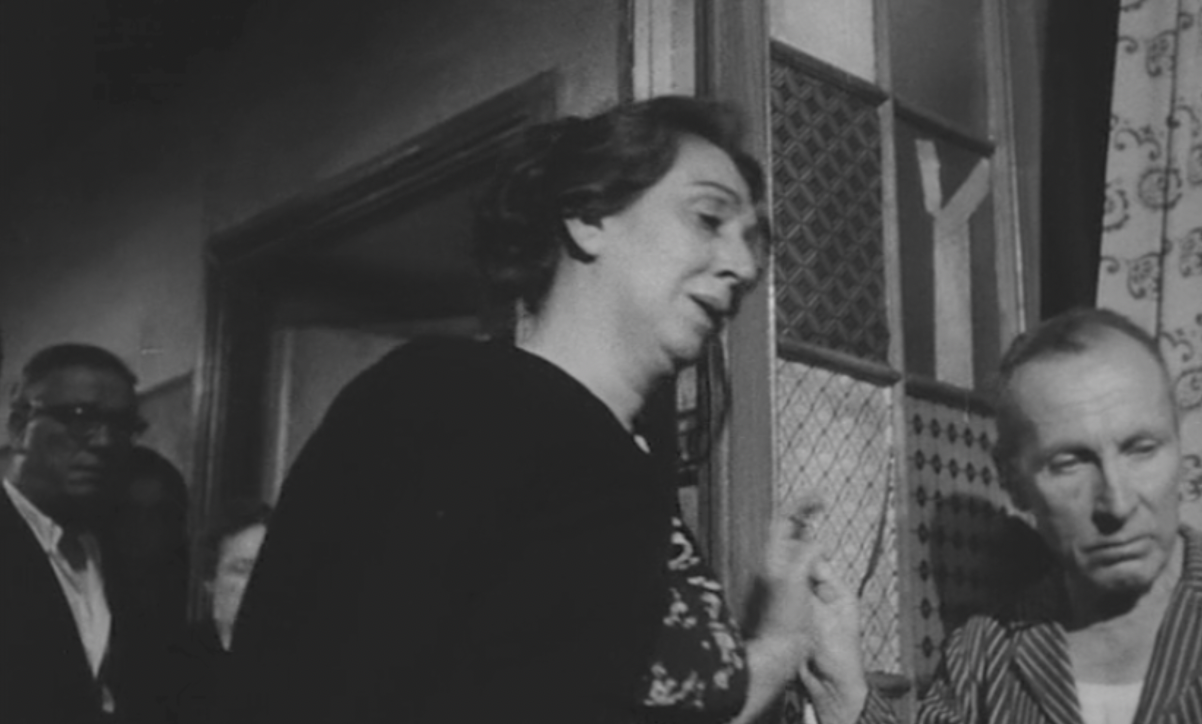Regia / Director: Nanni Loy, 1962
I due giovani uccisi dai tedeschi sono distesi su un letto. Piangendo, la madre di Arturo gli accarezza il viso.
The two young men killed by the Germans are laid out on a bed. Weeping, Arturo’s mother strokes his face.
Entra un uomo che indossa la giacca di un completo sopra la canottiera. Gesticolando, dice all'uomo calvo della battaglia: "L'altro ha il vestito stracciato. Io ho un vestito buono..."
“A cosa serve ormai?"
In walks a man wearing a suit jacket over his undershirt. Gesturing, he says to the bald man from the battle, “The other one has torn clothes. I have good ones…”
“What does it matter now?”
"Anastasio è morto!" L'urlo proviene dall'esterno: una donna corre verso la casa.
“Anastasio’s dead!” The scream comes from outside: a woman runs towards the house.
"Fatemelo vedere!" Con energia furiosa, cerca di entrare, ma gli uomini la trattengono.
“Let me see him!” With furious energy, she tries to enter, but the men hold her back.
Liberandosi, corre nella stanza con i corpi e si ferma ai piedi del letto. "No, non è lui" – dice – "Madonna mia, ti ringrazio. Chissà di quale povera madre è figlio..."
Breaking free, she runs into the room with the bodies and stops short at the foot of the bed. “No, it’s not him,” she says. “Holy Virgin, thank you. Who knows whose poor mother he is the son of…”
Rivolgendosi all'uomo calvo e al suo compagno di battaglia, lei chiede: "Avete cercato di avvisarla?"
"E come? Non aveva neanche un documento".
Lei si fa il segno della croce.
Turning to the bald man and his companion from the battle, she asks, “Have you tried informing her?”
“How? He didn’t have even one document.”
She makes the sign of the cross.
Un'altra voce di donna: "Fatemi passare".
"Cosa c'è?"
"Sta correndo voce che ci sia un giovane morto che non si sa chi è".
"Ma che peccato hanno fatto per morire così giovani?"
Another woman’s voice: “Let me through.”
“What is it?”
“There's a rumor going around that there’s a young dead man who’s unknown.”
“What were their sins to have died so young?”
La madre di Arturo singhiozza: "Era quasi finita questa guerra!" Accarezza i capelli del figlio. "Com’è potuto succedere? Stamattina eri vivo e ora non ti potrò vedere più..." La macchina da presa si avvicina. "Figlio traditore, perché mi hai lasciato?"
Arturo’s mother sobs, “This war was almost over!” She strokes her son’s hair. “How could this happen? This morning you were alive and now I won’t be able to see you again…” The camera moves closer. “Traitorous son, why have you left me?”
L'uomo in giacca le tocca la spalla. "Signora, vuole portarlo via nonostante il coprifuoco?"
"Suo padre vuole così". Si gira di nuovo verso il figlio. "Arturo, viene ora papà e ce ne andiamo tutti e tre a casa". Il tassista è in lacrime. "Hai sentito? Hai sentito la mamma?"
The man in the jacket touches her shoulder. “Signora, do you want to take him away in spite of the curfew?”
“That’s what his father wants.” She turns back to her son. “Arturo, Daddy’s coming now and all three of us will go home.” The taxi driver is in tears. “Did you hear? Did you hear Mommy?”
Un'altra donna arriva e dà un'occhiata agli uomini morti. Tira un sospiro di sollievo.
"Lei per chi aveva paura?"
"Ho tre fratelli" – risponde lei – "Li stiamo cercando e siamo in pensiero".
Another woman arrives and takes a look at the dead men. She breathes a sigh of relief.
“Who were you afraid for?”
“I’ve got three brothers,” she answers. “We’re looking for them and we’re worried.”
Quando il padre di Arturo arriva, dice senza mezzi termini: "Ce lo dobbiamo portare così".
"Come così'?"
"In braccio. Non ho trovato nemmeno un carretto".
When Arturo’s father arrives, he says bluntly, “We have to carry him like this.”
“What do you mean ‘like this’?”
“In our arms. I haven’t found even a cart.”
"Vuole una mano?" chiede l'uomo con la giacca.
"Sì, grazie".
L'uomo va a prendere Arturo. "Aspettate. Fate piano, piano" – avverte la madre – "Non fate male a mio figlio".
“Do you want a hand?” asks the man in the jacket.
“Yes, thank you.”
The man goes to pick up Arturo. “Wait. Go easy, easy,” warns the mother. “Don’t hurt my son.”
"Oh, figlio, oh figlio mio!" mormora lei, mentre i due uomini portano il giovane morto. "Aspettate! Il suo fazzoletto, dov'è ?"
L'uomo si offre: "Vuole che vi accompagni fino a fuori?"
"No, grazie mille".
“My son, my son!” she mutters, as the two men carry the dead boy. “Wait! Where’s his handkerchief?”
The man offers, “Do you want me to accompany you outside?”
“No, thank you very much.”
Il padre di Arturo lo prende in braccio e si scusa dicendo: "Lo sento più contento se lo porto a casa sua".
Arturo’s father takes him in his arms, saying apologetically, “I feel he’d be happier if I take him home.”
La madre di Arturo segue il marito piangendo. Mormora: "Aspetta, ti aiuto..."
Arturo’s mother trails behind her husband, crying. She murmurs, “Wait, I’ll help you…”
In strada, la gente si ferma a rendere omaggio, prima di affrettarsi a tornare a casa per il coprifuoco.
Ma altri arrivano alla casa, temendo che il morto sconosciuto possa essere il loro. Una voce commenta: "Che processione! Questa notte, nonostante il coprifuoco, verrà mezza Napoli".
Sul marciapiede, un nuovo arrivato si chiede: "Sarà quella la casa?"
"È l'unica porta illuminata...".
In the street, people stop to pay their respects, before hurrying to get home because of the curfew.
But others are arriving at the house, afraid that the unknown dead man could be their own. A voice comments, “What a procession! Tonight, despite the curfew, half of Naples will come.”
On the sidewalk, a newcomer wonders, “Would that be the house?”
“It’s the only lit door…”
FINE PARTE 10
Here is Parte 11 of this cineracconto. Subscribe to receive a weekly email newsletter with links to all our new posts.








































